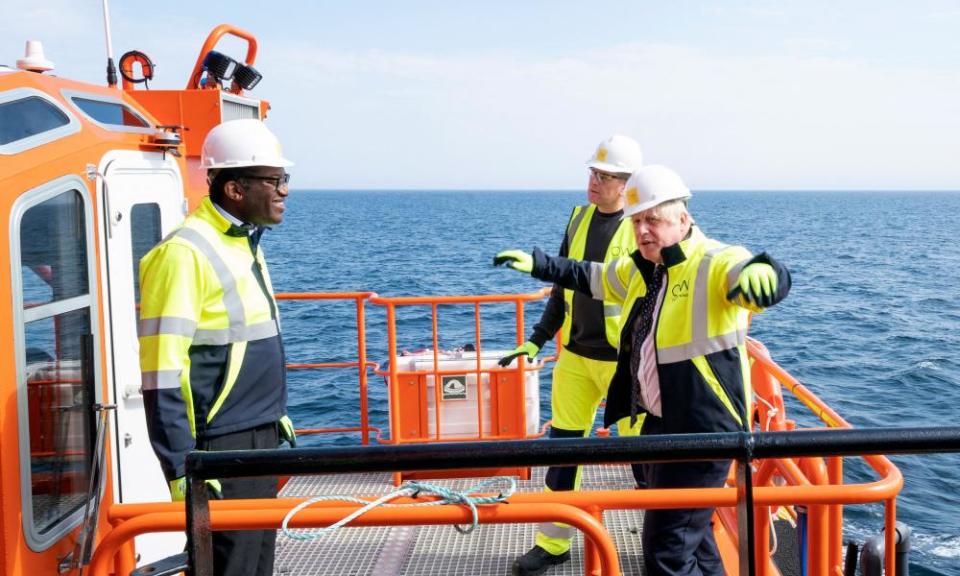It seems the Conservatives failed to fix the country while the gas was flowing

Dark days loom – perhaps literally – as Britain’s energy situation moved from a “squeeze” to a “crisis” over the weekend, rising swiftly through the gears of journalistic alarm.
You can hang around in the crisis classification for quite some time, of course, and there’s debate as to what the next gear is formally termed. But Monday saw Kwasi Kwarteng sweep in to insist it wasn’t “three-day week” or “winter of discontent”. Far from it, was the business secretary’s message from the dispatch box. If anything, it was going to be a winter of content. So much content – unless, of course, we get a prolonged cold season. No one wants a cold winter less than the government, with the possible exception of the UK hedgehog population or the Daily Telegraph subscriptions department.
“There will be no rewards for failure or mismanagement” for the energy companies, intoned Kwarteng – perhaps not the consequence-based space this government wants to get into, after its various triumphs over the past 18 months.
Despite having failed to fix the country’s overly liberalised and badly designed energy market while the sun was shining, or the gas was flowing, or whatever the au courant bollocks-of-choice is – and despite the imminent universal credit cut threatening to combine with the energy crisis to plunge people into poverty this winter – it’s encouraging to find the secretary of state still finding space to discuss all this in the bracing terms of free-market ideology.
If you are a truly enterprising citizen, why not invest in your future by buying a Calor Gas canister? It could be worth double what you paid for it by next week. If you wish to widen your portfolio, get a cow to fart into a plastic bag.
As experts in metaphorically fiddling with the gaslights, you’d think ministers would have been earlier attuned to potential supply issues. Yet up until last week, the only gas they kept wanging on about was nitrous oxide, with Priti Patel looking into the criminalisation of laughing gas. Those were jollier gas times, certainly, given that Kwarteng is now in the position of insisting we won’t have blackouts.
Indeed, arguably the worst moment for the lights to go out – switched off by the invisible hand – would be right in the middle of the rapidly approaching Cop26 climate conference. Nothing could be more convenient for those countries resisting net-zero goals – whose current plan for the poorer nations seems to be to sink them, and who would somehow find excuses for waiting-and-seeing even if the conference were being held on a collapsing ice shelf or in the middle of a forest fire.
They are, of course, vocally supported by that rather-too-large section of society that will believe the climate science is “settled” only when they’re beating back children to catch the last lifeboat off Ben Nevis. Even now, total inaction is being pushed by people who expect a limitless supply of items manufactured in China, while smugly pointing out that China pollutes more than us.
Like his new trade secretary, Anne-Marie Trevelyan, the prime minister was until relatively recently of their number. Boris Johnson now claims to have undergone one of his many expedient conversions on the subject of climate change, but a lowlights reel would surely include the sort of newspaper columns in which he hailed Piers Corbyn as some kind of eminent meteorological sage. “When so many of his predictions come true,” Johnson previously opined of a man who has since been arrested over leaflets comparing the Covid vaccination programme to Auschwitz, “I feel I want to know more.” Mmm. Whenever I see Piers Corbyn I feel want to know much, much less.
Johnson is now in the US, and may even get some kind of deeper financial commitment on climate from President Biden. This would be good news, though it would have to be set against the failure to even firm up the attendance of China’s Xi Jinping at Cop26.
Among experts, there is a growing sense that, if serious progress was the aim, Johnson has engaged miles too late. Alas, for the past two years the UK has operated with a just-in-time prime minister, where the supply of effort to back up some stuff he’s said tends to come onstream only at the last minute. This was never going to be the approach to get the best out of Cop26. We might not be quite in the thoughts-and-prayers phase of the conference before it has even begun – but let’s just say we are not exactly cooking with gas.
Marina Hyde is a Guardian columnist

 Yahoo Finance
Yahoo Finance 